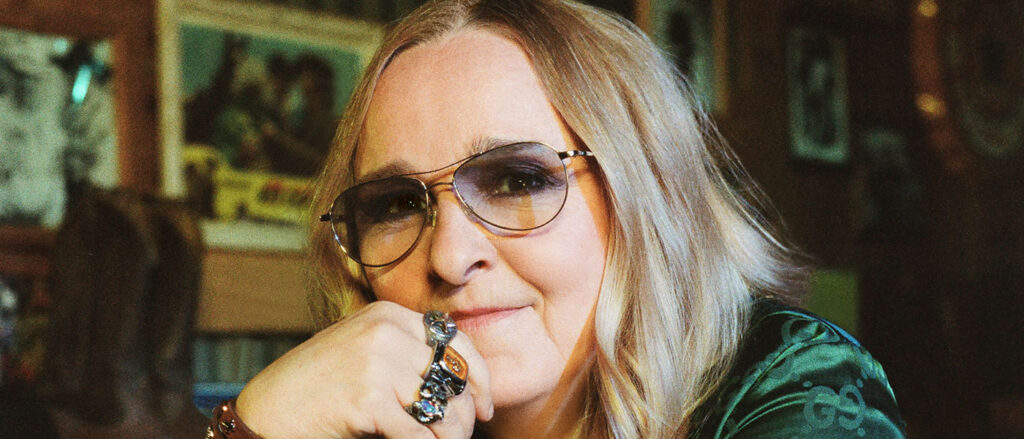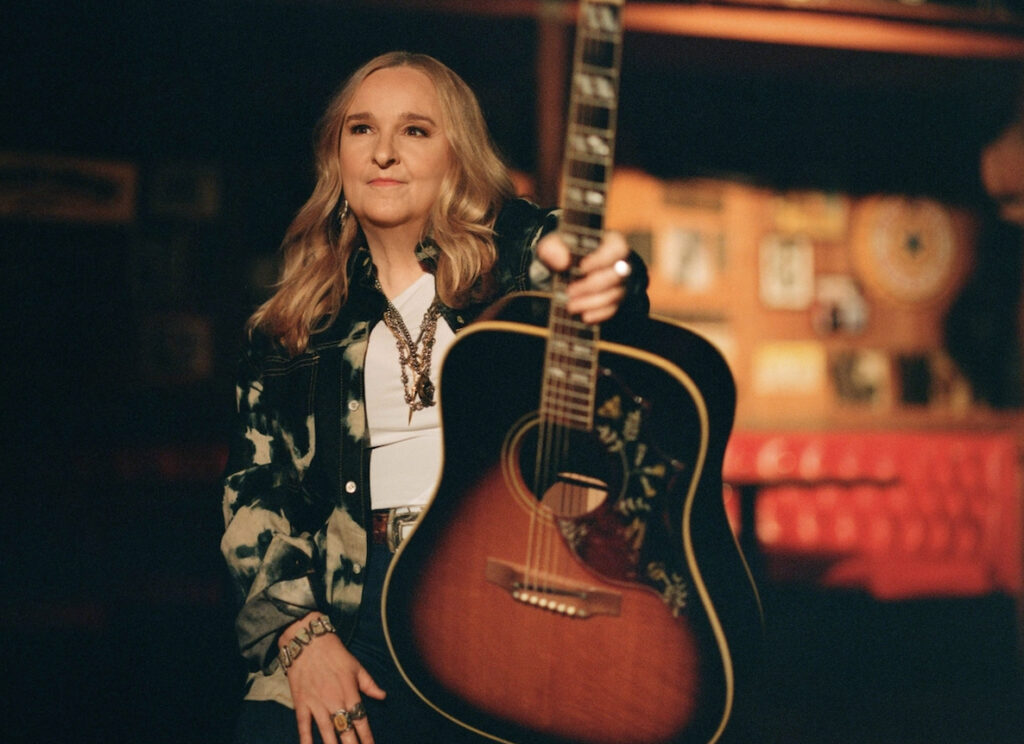Looking back at Melissa Etheridge’s body of work
Ahead of her one woman show, A Journey Through Life – My Window, we revisit our interview with the legendary lesbian singer-songwriter, guitarist, and activist Melissa Etheridge.
Few people have experienced the highs and lows of the music business to the degree that Melissa Etheridge has. Since releasing her self-titled debut in 1988, she has won two Grammys (and been nominated for many others); been hailed as the second coming of Janis Joplin; become a lesbian icon; won the Gibson Award for Best Female Rock Guitarist; become a Mom several times over; been a social activist not only for the LGBTQ community, but also for terminally ill adults and people with opioid addiction; performed in Times Square on New Year’s Eve; and written a book. Not bad for a queer kid from Leavenworth, Kansas!
That said, Etheridge has also suffered more than her share of setbacks. She has weathered a couple of high profile divorces; braved a battle with breast cancer (who can forget her duet with Joss Stone at the 2005 Grammys, in which she took the stage bald after undergoing chemotherapy); and, just last year, lost her son Beckett to opioid addiction.
The one constant throughout all these ups and downs has been her music—a brand of heartland rock that manages to be personal and universal at the same time. At her core, Etheridge is a uniter. She is nearly as popular with blue collar males as she is with lesbians owing to her raspy vocals, formidable guitar chops and unpretentious persona. And she’s racked up an impressive list of hits over the years including “Bring Me Some Water,” “Ain’t It Heavy,” “I’m The Only One,” “Come To My Window” and “I Want To Come Over.”
I recently had the pleasure of catching up with this down-to-Earth icon for QueerForty. We discussed everything from her latest album, One Way Out, to her memories of growing up gay in the Midwest.
[Let’s start with] the new record, which is One Way Out. Tell me a little about how it came together. Aparently, these nine songs are not new; most of them were written a good 30 years back, right?
Melissa: Yeah! About 2013, I started thinking that I would like to release a box set. I started digging back into my past music. And I started finding all these songs — I had some recorded, some just demoed — of these older songs for my second, third, fourth album. And I was like, “Hey, these are good songs! Why didn’t they make it?” [But] then I ended up changing everything. I left the record company, I changed management.
So I had recorded those songs. I went back in 2013 [or] ’14 with my old band — Kevin [McCormick] and Fritz [Lewak] and John Shanks, the band from 1988. It was really fun to go in and see ‘em all again. And last year, BMG was like, “Hey, do you have anything?” And I said, “You know what? I do. I have this project that I did [but it’s] unfinished.” So we brought it out, finished it up [and] put two live tracks on from 2002. And I [thought] “For those who like the sort of older, heartbroken things that I was goin’ through back then, this is fun!” It’s fun to sing the songs and not feel so horrible anymore.” (Laughs)
But know that they’re just a short walk away!
Melissa: Yes, exactly!
Tell me about the single “As Cool As You Try.” It’s got a nice kinda bluesy vibe to it.
Melissa: Yeah, it’s fun. These songs — all of ‘em have a real rock-blues feel. Because that’s kinda what I was learning back there in the late ‘80s [and] early ‘90s. That’s kinda where I was. And it’s cool to bring that back.
The song itself really came from the first few years where my albums were just starting to come out and getting a little bit of press here and there. And, you know, a couple of GRAMMY nominations. I kept thinking, “What do I wear? I don’t look like anybody else. I’m gay. I’m not out, but I am, but I’m not really.” You know, it really used to twist me up. And it’s funny, ‘cause I think it’s a song that I wrote to myself. [It’s my way of] saying, “Look! You’re just as cool as you feel on the inside.” That’s really what it’s about. Here I was in Hollywood and, you know, I was a little insecure. So that song came from that.
Interesting. The other one that jumped out at me — which is a little different from [the other] tracks on the record — is “Wild, Wild, Wild.” It’s a really pretty tune.
Melissa: Yeah, I really like that song. One of the reasons it didn’t make — this [would have been] the third album — was that I wasn’t out yet publicly. And I felt that the song was obviously about a woman. (laughs) Even though I didn’t say “she” or “her, it’s such a gentle song about a troubled lover. I remember thinking, “I can’t.” I wasn’t ready. Now I look at like, “Oh, it’s such a sweet type of song.” I’m glad I finally released it to the world.
You grew up in Leavenworth, Kansas. I myself have not been to Kansas; I have interviewed a couple of other musicians from there and heard a little about it. Doesn’t seem like the most progressive state in the union! (she laughs) What was it like growing up in the ‘70s, knowing that you were in queer in a place like Leavenworth, Kansas as opposed to, say, here in New York City?
Melissa: Oh Gosh! Very, very different. Yes, Kansas is very conservative. Yet where I grew up in Kansas is very unique. Leavenworth had a fort that was a part of the city — Ft. Leavenworth. So we had this one high school and every year we’d get a whole new crop of kids — officers’ kids, who had been all around the world. So you got this feeling of it [being] more than just this small town. And we were just 45 minutes from Kansas City; Missouri was just right over the river.
Still, it was the ‘70s. There was not a single mention of gay, homosexual, lesbian — nothing! It was sort of how everything was in the ‘70s. You know, you didn’t talk about it yet I remember seeing in magazines — like TIME magazine, on the cover, was talking about the gay liberation [that] was happening in New York City. It was exciting to see that and go, “Wait a minute, I think that’s what I am.” But goodness! New York was ahead of us.
I know you’ve done a lot of charity work, but I wanted to specifically ask you about The Etheridge Foundation. I don’t know much about that and was hoping you could clue me and the readers in.
Melissa: Absolutely. Well, after I lost my son last year to opioid addiction, I really wanted to — you know, it’s something you do out of grief. You wanna make a difference. You want to help. So the Etheridge Foundation [gives] money and grants to people who are working to find alternatives to pain relief: alternatives other than pharmaceuticals and opioids. Hopefully, we’ll be able to put more into plant medicines when there’s more legalization of all that. But right now, we’re just moving towards research and finding other ways to help people understand and cope with pain.
I appreciate you telling me that, and my condolences. One of my close friends lost his daughter a few years ago very suddenly. She was a young actress here in New York. And he and his wife have started an annual scholarship for drama students to sort of honor her memory.
Melissa: Mm-hmm! Yeah, you just do what you can, you know? And you try to help others along the path.
I can’t let you go without asking you about my favorite song of yours, which is “Ain’t It Heavy.” I”m sure you’ve been asked about it a zillion times, but it’s gonna be a zillion and one! Just any memories you have about that song.
Melissa: Oh, “Ain’t It Heavy?” That’s cool! Actually, that’s not one that people ask [about] very often. So I appreciate you [asking].
On the third album, Never Enough, I got quote-unquote experimental. You know, it was my third studio album. So I did stuff like “2001” and “Must Be Crazy” and those kinda songs. But “Ain’t It Heavy” was a straightforward rocker. Once again, on that third album, I was walking the line between [thinking] “Oh God, people are gonna know that I’m gay. I’m just kinda singing ‘Spread these wings and I’m on for the ride’ and all that stuff. I’m like, ‘They’re gonna know!’ (she laughs again) But I was alright with people knowing. I wanted to present a strong kinda rock and roll song.
To wrap up — tell me about the rest of this year and maybe the first half of 2022 holds for you. Touring, new music, anything I don’t know about.
Melissa: Let me see… I’m so grateful that I’m able to tour now. Most of the dates are holding and it looks like people are willing to come out and enjoy live music again. So we’re touring up until my cruise [in November]. Then I”ll take the holidays off and [in] January [or] February, I’m hoping to be working on a new book. We’ll see if that happens.
One Way Out is available now. Subscribe to Etheridge TV for much more of Melissa.







